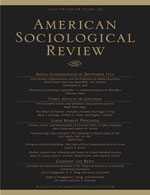The Extended Family and Children's Educational Success
Article by Mads Meier Jæger
American Sociological Review 77(6): 903-922.
Social stratification research has repeatedly demonstrated that parents have a significant impact on their children’s educational success. A new article published in American Sociological Review shows that the importance of family background pertains not only to the immediate family: Grandparents and aunts and uncles also contribute to children’s educational success.
The extended family
An important explanation why the extended family matters is that it acts as a social network that contributes with economic and social resources to the immediate family. In case of adverse events in the immediate family, for example unemployment or illness, the extended family may contribute resources (money, time, care etc.) which alleviate the negative impact of these events on children’s well-being.
The article also shows that economic and social resources in the extended family are particularly important for children growing up in families with only few resources.
Most theories of social mobility focus on how parents affect children. The main argument in this article is that the traditional approach is to too narrow and does not take into account that children spend time with:
- Grandparents
- Aunts and uncles
- Cousins
Data from three generations
The article draws on data from the U.S. that include information on three generations from the same family, as well as information on siblings and first cousins.
The empirical analysis shows that influences from the extended family (a combination of genes and environments shared by first cousins) account for 14-21 percent of the total variance in educational attainment in adulthood. The influences from the immediate family (shared by brothers and sisters) explain 26-35 percent.
Possible compensation for lack of resources
The analysis also shows that the impact of the extended family is particularly strong in families in which parents have low education and low income. This result suggests that the extended family compensates lacking resources in the immediate family.
Read the entire article in American Sociological Review (external page).
Listen to an interview with Mads Meier Jæger concerning the results presented in the article (external page).
